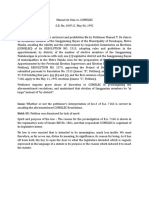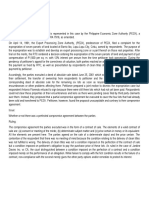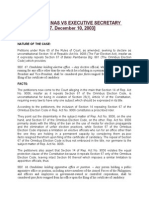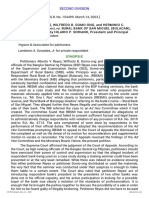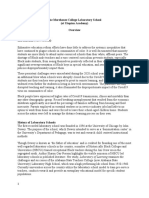Medalla V Sto Tomas
Medalla V Sto Tomas
Uploaded by
Happy Malacas AragonCopyright:
Available Formats
Medalla V Sto Tomas
Medalla V Sto Tomas
Uploaded by
Happy Malacas AragonOriginal Description:
Original Title
Copyright
Available Formats
Share this document
Did you find this document useful?
Is this content inappropriate?
Copyright:
Available Formats
Medalla V Sto Tomas
Medalla V Sto Tomas
Uploaded by
Happy Malacas AragonCopyright:
Available Formats
MEDALLA V. STO. TOMAS, 208 SCRA 351 G.R. No. 94255 May 5, 1992PARAS, J.
:
FACTS: Petitioner, Engr. Ricardo Medalla, was appointed as a Geodetic Engineer of the then Manila International Airport Authority (MIAA for brevity). In 1986, he was promoted to Supervising Engineer A of its Buildings, Pavements and Grounds Division, otherwise known as the B P and G Division. On February 16, 1987, Engr. Elpidio Mendoza, the said Decision's Department Manager, was likewise promoted, thereby leaving his position vacant. In view thereof, Engr. Armando Singson was designated as the Acting Division Manager on July 1, 1987. The MIAA Selection/Promotion Board, however, unanimously appointed Medalla as the new Division Manager B of the B P and G Division. Medalla was issued his formal appointment by the then MIAA General Manager Aurelio German after which he immediately assumed his post. Apparently aggrieved over Medalla's appointment, Singson filed a protest to the Merit Systems Protection Board (MSPB) of the Civil Service Commission which endorsed the same to the MIAA General Manager for appropriate action in accordance with Section 14 of CSC Resolution No. 83-343. In response thereto, Mr. German affirmed Medalla's promotional appointment and in effect dismissed Singson's protest. The latter appealed the decision once more to the MSPB which again referred the same to the MIAA General Manager for comment. Acting thereon, Mr. Evergisto C. Macatulad as the Officer-in-Charge, reiterated MIAA's position as contained in the letter of Mr. German, thus reaffirming Medalla's appointment. The MSPB then required the submission of the list of positions considered next-in-rank, the approved organization chart and systems of ranking positions and the qualification standards for the contested position which was duly complied with by the MIAA. In the meantime, the MIAA underwent a reorganization pursuant to its Resolutions Nos. 87-55 and 87-68 dated as early as September 30 and October 22, 1987 respectively. Its new staffing pattern was approved by the Department of Budget and Management thus the MIAA Placement Committee deliberated on personnel appointments prescinding from the said pattern. Medalla and Singson were subsequently reappointed as Division Manager D and Principal Engineer C respectively of the new Civil Works Division which replaced the former B P and G Division due to added functions . Both ostensibly accepted their new designations. ISSUE: WON the act of the Commission through the MSPB in replacing an appointee with an employee of its choice is valid. HELD: NO. The Court has already repeatedly ruled that the Commission has no such authority to do so. Its only function is limited to approving or reviewing appointments to determine their accordance with the requirements of the Civil Service Law (Chang v. CSC, et al., G.R. No. 86791, November 26, 1990, 191 SCRA 663). Thus, when the Commission finds the appointee to be qualified and all the other legal requirements have been satisfied, it has no choice but to attest to the appointment (Central Bank of the Philippines, et al., v. CSC, G.R. Nos. 80455-56, April 10, 1989, 171 SCRA 774). Thereafter, its participation in the appointment process ceases (Orbos v. CSC, G.R. No. 92561, September 12, 1990, 189 SCRA 464). Indeed, the determination of who among several candidates for a vacant position has the best qualifications is vested in the sound discretion of the Department Head or appointing authority and not in the Commission (Gaspar v. Court of Appeals, et al., G.R. No. 90799, October 18, 1990, 190 SCRA 777). This is because the appointing authority occupies the ideal vantage point from which to identify and designate the individual who can best fill the post and discharge its functions in the government agency he heads (Abila v. CSC, et al., G.R. No. 92573, June 13, 1991, 198 SCRA 102). Consequently, when the appointing authority has already exercised his power of appointment, the Commission cannot revoke the same on the ground that another employee is better qualified for that would constitute an encroachment on the decision vested in the appointing authority (Luego v. CSC, G.R. No. 69137, August 5, 1986; Pintor v. Tan, G.R. Nos. 84022 and 85804, March 9, 1989, En banc). The Commission may not and should not substitute its judgment for that of the appointing authority (Patagoc v. CSC, et al., G.R. No. 90229, May 14, 1990, 189 SCRA 416). In fine, the Court has categorically ruled: We declare once again, that the Civil Service Commission has no power of appointment except over its own personnel. Neither does it have the authority to review the appointments made by other offices except only to ascertain if the appointee possesses the required qualifications. The determination of who among aspirants with the minimum statutory qualifications should be preferred belongs to the appointing authority and not the Civil Service Commission. It cannot disallow an appointment because it believes another person is better qualified and much less can it direct the appointment of its own choice. Appointment is a highly discretionary act that even this Court cannot compel. While the act of appointment may in proper cases be the subject of mandamus, the selection itself of the appointee taking into account the totality of his qualifications, including those abstract qualities that define his personality is the prerogative of the appointing authority. This is a matter addressed only to the discretion of the appointing authority. It is a political question that the Civil Service
Commission has no power to review under the Constitution and the applicable laws. (Lapinid v. CSC, et al., G.R. No. 96298, May 14, 1991). The Commission appears to have overstepped its jurisdiction when it revoked the appointment of petitioner Medalla who was shown to have satisfied the requirements prescribed for the contested position, and instead directed the appointment of protestant Singson.
You might also like
- Counter Affidavit SAMPLEDocument2 pagesCounter Affidavit SAMPLEHappy Malacas Aragon85% (74)
- A Switch in Time Chapter 1Document11 pagesA Switch in Time Chapter 1api-27228698100% (2)
- The Group AssessmentDocument2 pagesThe Group AssessmentFaqihah HaslubisNo ratings yet
- PMI UNION v. PMI COLLEGES BOHOL (STRIKE) - FullDocument7 pagesPMI UNION v. PMI COLLEGES BOHOL (STRIKE) - FullkrizzledelapenaNo ratings yet
- GRAND FARMS Vs CADocument2 pagesGRAND FARMS Vs CAJoel MilanNo ratings yet
- Admin Cases CompDocument11 pagesAdmin Cases Compwilfred poliquit alfeche100% (1)
- Innominate Contract 166299 300Document1 pageInnominate Contract 166299 300kimmytolosaNo ratings yet
- Aguilar v. Lightbringers Credit CoopDocument4 pagesAguilar v. Lightbringers Credit CoopMac Burdeos CamposueloNo ratings yet
- Cabagnot Vs CSC 223 SCRA 59Document9 pagesCabagnot Vs CSC 223 SCRA 59Nurz A TantongNo ratings yet
- Compilation Transpo Cases 1Document11 pagesCompilation Transpo Cases 1CristineNo ratings yet
- GR No. 192088 Ideals Vs PsalmsDocument64 pagesGR No. 192088 Ideals Vs PsalmsEi YouNo ratings yet
- G.R. No. 181613 November 25, 2009Document2 pagesG.R. No. 181613 November 25, 2009Min Capili ElardoNo ratings yet
- Quiason, J.: Francisco Tatad, John Osmeña and Rodolfo Biazon v. Jesus Garcia, Jr. (DOTC Sec.), EDSA LRT Corp. LTDDocument7 pagesQuiason, J.: Francisco Tatad, John Osmeña and Rodolfo Biazon v. Jesus Garcia, Jr. (DOTC Sec.), EDSA LRT Corp. LTDAilene Heramil PonioNo ratings yet
- De Guia vs. COMELEC G.R. No. 104712. May 06, 1992Document1 pageDe Guia vs. COMELEC G.R. No. 104712. May 06, 1992Popoy SolanoNo ratings yet
- Barretto vs. TuasonDocument25 pagesBarretto vs. TuasonKcompacion0% (1)
- Rallos V Go Chan and Sons Realty CoDocument1 pageRallos V Go Chan and Sons Realty CoReena MaNo ratings yet
- Gamogamo vs. PNOC Shipping and Transport Corp., 381 SCRA 742 (2002Document16 pagesGamogamo vs. PNOC Shipping and Transport Corp., 381 SCRA 742 (2002Mei SuyatNo ratings yet
- Oil and Natural Gas vs. CADocument1 pageOil and Natural Gas vs. CAMilcah MagpantayNo ratings yet
- ABSCBN V CTADocument2 pagesABSCBN V CTAG SNo ratings yet
- Republic Vs FlorendoDocument1 pageRepublic Vs Florendo000012No ratings yet
- Pelaez Vs Auditor GeneralDocument2 pagesPelaez Vs Auditor GeneralMaricar Corina CanayaNo ratings yet
- Bienvenido Gelisan Vs AldayDocument2 pagesBienvenido Gelisan Vs AldayTeoti Navarro ReyesNo ratings yet
- Bank of Commerce v. Webster DIGESTDocument2 pagesBank of Commerce v. Webster DIGESTkathrynmaydevezaNo ratings yet
- Heirs of Pedro Lopez v. de CastroDocument3 pagesHeirs of Pedro Lopez v. de CastroRogie ApoloNo ratings yet
- Evangelista Vs JarencioDocument2 pagesEvangelista Vs JarenciojaneNo ratings yet
- Arada v. CADocument2 pagesArada v. CAJocel BatagaNo ratings yet
- De Guia vs. Comelec G.R. No. 104712Document3 pagesDe Guia vs. Comelec G.R. No. 104712Gendale Am-isNo ratings yet
- Rodolfo Farinas VS Executive SecretaryDocument4 pagesRodolfo Farinas VS Executive SecretaryZale CrudNo ratings yet
- Marmeto V COMELECDocument1 pageMarmeto V COMELECBaisy VillanozaNo ratings yet
- Abainza v. Arellano, G.R. No. 181644, December 8, 2008, 573 SCRA 332Document5 pagesAbainza v. Arellano, G.R. No. 181644, December 8, 2008, 573 SCRA 332Agnes FranciscoNo ratings yet
- 036 - Chua v. IACDocument2 pages036 - Chua v. IACalexis_beaNo ratings yet
- Digest Office of The Ombudsman V Samaniego 2008Document3 pagesDigest Office of The Ombudsman V Samaniego 2008Lea Gabrielle FariolaNo ratings yet
- Pandi V CA DigestDocument2 pagesPandi V CA DigestrubsyadowNo ratings yet
- People V GalloDocument4 pagesPeople V GalloAllen Windel BernabeNo ratings yet
- 2018 Boston Finance and Investment Corporation v. Candelario v. Gonzalez PDFDocument13 pages2018 Boston Finance and Investment Corporation v. Candelario v. Gonzalez PDFChesca MayNo ratings yet
- (G.R. No. L-11602) Cuadra v. CordovaDocument3 pages(G.R. No. L-11602) Cuadra v. CordovaThe FlipNo ratings yet
- Northwest Airlines V CuencaDocument1 pageNorthwest Airlines V CuencaStephanie ValentineNo ratings yet
- Sunville vs. Judge AbadDocument1 pageSunville vs. Judge Abadandy bilanNo ratings yet
- People VDocument18 pagesPeople VAnonymous NqaBAyNo ratings yet
- LBP vs. Franco, GR 203242, March 12, 2019Document24 pagesLBP vs. Franco, GR 203242, March 12, 2019pennelope lausanNo ratings yet
- SPOUSES TANGLAO vs. SPOUSES PARUNGAO - Case DigestsDocument3 pagesSPOUSES TANGLAO vs. SPOUSES PARUNGAO - Case DigestsJetJuárezNo ratings yet
- Reyes v. Rural Bank of San MiguelDocument13 pagesReyes v. Rural Bank of San Miguellovekimsohyun89No ratings yet
- Vigan Vs PSCDocument1 pageVigan Vs PSCTammy YahNo ratings yet
- 7c Yonoha Vs CADocument5 pages7c Yonoha Vs CAKatherine Christy Rosal LigcubanNo ratings yet
- 1-US Vs Tan PiacoDocument1 page1-US Vs Tan PiacoVicelle QuilantangNo ratings yet
- 2 Nestle Philippines, Inc. v. Uniwide Sales Inc., G.R. No. 174674, October 20, 2010Document6 pages2 Nestle Philippines, Inc. v. Uniwide Sales Inc., G.R. No. 174674, October 20, 2010Aivy Christine ManigosNo ratings yet
- Asilo v. Bombasi ReportDocument3 pagesAsilo v. Bombasi ReportG Ant MgdNo ratings yet
- Tuanda v. Sandiganbayan DigestDocument1 pageTuanda v. Sandiganbayan DigestChris YapNo ratings yet
- Saldana vs. Phil. GuarantyDocument1 pageSaldana vs. Phil. GuarantyKeilah ArguellesNo ratings yet
- Olsen & Co. v. AldaneseDocument3 pagesOlsen & Co. v. AldaneseNikki Malferrari100% (1)
- Ommission On Human Rights EmployeesDocument2 pagesOmmission On Human Rights Employeesmaria luzNo ratings yet
- Gonzales Vs Kalaw KatigbakDocument4 pagesGonzales Vs Kalaw KatigbakMark Joseph M. VirgilioNo ratings yet
- Reyes Vs Maxim's Tea House Case DigestDocument1 pageReyes Vs Maxim's Tea House Case DigestKaren RonquilloNo ratings yet
- Credit TransDocument8 pagesCredit TransMa-an SorianoNo ratings yet
- Bitanga v. Pyramid, G.R. 173526, 28 August 2008Document1 pageBitanga v. Pyramid, G.R. 173526, 28 August 2008Kim SimagalaNo ratings yet
- Protacia vs. Atty. MendozaDocument2 pagesProtacia vs. Atty. MendozaLloyd David P. VicedoNo ratings yet
- Rabor vs. CSCDocument2 pagesRabor vs. CSCMuah CamNo ratings yet
- Pantranco V PSCDocument2 pagesPantranco V PSCKaren AbellaNo ratings yet
- Tan v. CrisologoDocument10 pagesTan v. CrisologoSofia BrondialNo ratings yet
- Ruperto A. Ambil, JR., Petitioner, vs. The Commission On Elections (First Division, Formerly Second Division)Document3 pagesRuperto A. Ambil, JR., Petitioner, vs. The Commission On Elections (First Division, Formerly Second Division)Jennifer MortejoNo ratings yet
- Medalla Vs Sto Tomas Case DigestDocument2 pagesMedalla Vs Sto Tomas Case DigestJivyNo ratings yet
- Medalla vs. Sto. Tomas - Case DigestDocument2 pagesMedalla vs. Sto. Tomas - Case DigestHoven Macasinag100% (2)
- Lapinid To MedallaDocument27 pagesLapinid To MedallaJean Ben Go SingsonNo ratings yet
- 18 Shang Properties Realty Corp. v. St. Francis Development Corp.Document2 pages18 Shang Properties Realty Corp. v. St. Francis Development Corp.Happy Malacas Aragon100% (1)
- Subject: Oral Defamation or SlanderDocument5 pagesSubject: Oral Defamation or SlanderHappy Malacas AragonNo ratings yet
- 1.1 Traveler's Insurance V CA 272 Scra 536Document5 pages1.1 Traveler's Insurance V CA 272 Scra 536Happy Malacas AragonNo ratings yet
- Civil LawDocument16 pagesCivil LawThe Supreme Court Public Information Office100% (2)
- Puboff CompleteDocument8 pagesPuboff CompleteasandaloNo ratings yet
- Meram V EdralinDocument5 pagesMeram V EdralinHappy Malacas AragonNo ratings yet
- Digest 16.2 Guerrero V RTC Ilocos NorteDocument1 pageDigest 16.2 Guerrero V RTC Ilocos NorteHappy Malacas AragonNo ratings yet
- Contract of TransportationDocument13 pagesContract of TransportationHappy Malacas AragonNo ratings yet
- Complaint SampleDocument4 pagesComplaint SampleHappy Malacas AragonNo ratings yet
- Mr. Peter BanagDocument2 pagesMr. Peter BanagHappy Malacas Aragon100% (5)
- Pelvic ExamDocument5 pagesPelvic ExamKate RamosNo ratings yet
- 104 Supreme Court Reports Annotated: Quinagoran vs. Court of AppealsDocument12 pages104 Supreme Court Reports Annotated: Quinagoran vs. Court of AppealsFairyssa Bianca SagotNo ratings yet
- Accommodation HostelDocument5 pagesAccommodation Hostelbhat24108No ratings yet
- Seismic InversionDocument44 pagesSeismic Inversionjose_regueiro_4100% (5)
- The Strategic Audit Dr. Jacques Saint-Pierre Adjunct Professor Department of Finance, Insurance and Real Estate School of Business Administration Laval University, QC, Canada, G1K 7P4Document6 pagesThe Strategic Audit Dr. Jacques Saint-Pierre Adjunct Professor Department of Finance, Insurance and Real Estate School of Business Administration Laval University, QC, Canada, G1K 7P4Prayag DasNo ratings yet
- Configure EAP-TLS Authentication With ISE PDFDocument18 pagesConfigure EAP-TLS Authentication With ISE PDFkongarajaykumarNo ratings yet
- Myntra - Media StrategyDocument13 pagesMyntra - Media StrategyPiyush KumarNo ratings yet
- MMR 2 Vaccine InsertDocument11 pagesMMR 2 Vaccine InsertJonNo ratings yet
- Comprehensive Objective Physics For Iit Jee Neet Competitive Exams Volume 2 II Narinder Kumar CompressDocument852 pagesComprehensive Objective Physics For Iit Jee Neet Competitive Exams Volume 2 II Narinder Kumar Compress0852altafNo ratings yet
- بنية الزمن في الرواية العربية المعاصرةDocument27 pagesبنية الزمن في الرواية العربية المعاصرةRawan MazakNo ratings yet
- Celebrating Our Milestones in International School Library Month (ISLM)Document13 pagesCelebrating Our Milestones in International School Library Month (ISLM)Davi RamkallawanNo ratings yet
- Assesment of NewbornDocument3 pagesAssesment of NewbornBhawna PandhuNo ratings yet
- Family Violence in BangladeshDocument13 pagesFamily Violence in BangladeshFerdous MostofaNo ratings yet
- The Morehouse College Laboratory SchoolDocument10 pagesThe Morehouse College Laboratory Schoolapi-377784643No ratings yet
- Set 6Document24 pagesSet 6Soumava BasuNo ratings yet
- July 19-25, 2015Document6 pagesJuly 19-25, 2015jaroCLNo ratings yet
- The Programmable World: Scientific American November 2014Document19 pagesThe Programmable World: Scientific American November 2014Archan rajNo ratings yet
- 16 Bài Tập Đột Phá Tư Duy Đọc HiểuDocument96 pages16 Bài Tập Đột Phá Tư Duy Đọc HiểuLan Nguyen100% (1)
- Customer Relationship AssignmentDocument14 pagesCustomer Relationship AssignmentKomal KatariaNo ratings yet
- Arbitration and LitigationDocument6 pagesArbitration and LitigationTom HonNo ratings yet
- Term - 1 Grade 5 PortionsDocument4 pagesTerm - 1 Grade 5 PortionsstakashiNo ratings yet
- Completed Roadmap To Moles OrganizerDocument1 pageCompleted Roadmap To Moles Organizerapi-481387154No ratings yet
- International Mathematical Olympiad National Selection TEST 2021 (IMONST 2021) Secara OnlineDocument3 pagesInternational Mathematical Olympiad National Selection TEST 2021 (IMONST 2021) Secara OnlineSuhaila SallehNo ratings yet
- BJSTR MS Id 001533Document8 pagesBJSTR MS Id 001533mariana godoyNo ratings yet
- Retail Book Chap01Document19 pagesRetail Book Chap01Harman GillNo ratings yet
- Nevada Sagebrush Archives 11/19/13Document12 pagesNevada Sagebrush Archives 11/19/13The Nevada SagebrushNo ratings yet
- The Complete Guide - Answer KeyDocument63 pagesThe Complete Guide - Answer Key2157010782tranNo ratings yet
- Certificate of Accreditation: Perry Johnson Laboratory Accreditation, IncDocument3 pagesCertificate of Accreditation: Perry Johnson Laboratory Accreditation, IncLuis HuertaNo ratings yet













